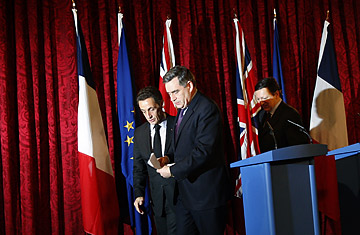
Sarkozy (left), Brown (centre) and Barroso at the Global Europe Europe Summit in London.
If the gilded walls of Lancaster House could speak, they would surely have interrupted Monday's meeting there to rebuke Gordon Brown for failing to invite Angela Merkel. Britain's Prime Minister was joined at the elegant mansion in London by French President Nicolas Sarkozy and E.U. Commission President Jose Manuel Barroso to discuss concerted European efforts to tackle the economic downturn, but there was no place at the table for the German Chancellor.
And while Downing Street is insisting Merkel's omission was innocuous and that the event, which business leaders also attended, was never conceived as an intergovernmental meeting, the more cynical view suspects that the German Chancellor may have been included if she did not hold a contrarian view on how to respond to the economic crisis. In a Dec. 1 speech, Merkel took a swipe at the theology so devoutly promulgated by Brown and Sarkozy — as well as by the U.S. President-elect Barack Obama — that governments should spend their way out of recession. "We will not take part in a race to top the latest proposals in a senseless race to spend billions," said Merkel, who has announced $15.4 billion in measures to stimulate the German economy — less than half the $33.4 billion France will apply to the same problem, and Britain's $34.8 billion package. German Finance Minister Peer Steinbruck was even more blunt. "Just because all the lemmings have chosen the same way doesn't automatically make it the right way," he told Der Spiegel.
Challenged at Lancaster House to explain Merkel's absence, Brown insisted the meeting had always been conceived with a limited cast. The message was reinforced by a Downing Street spokesman who briefed that the meeting was not a "summit" but just a "round-table discussion," although that spin effort was undermined by the words "Global Europe Summit" emblazoned on security passes for the event.
The Merkel snub dominated the concluding press conference, Sarkozy reacting angrily to a question from a British journalist about a schism with Merkel. Countries had at their disposal a tool kit of fiscal stimulus options, said Sarkozy, manically shredding a piece of paper as he spoke. "Gordon Brown used the tax tool. The fact that I didn't use the tool doesn't mean we disagree."
Still, Brown, Sarkozy and Barroso had all deemed it politic to separately disturb Merkel's Sunday rest with placatory phone calls ahead of their Lancaster House confab. Their powers of persuasion will be more thoroughly tested when she joins them at the European Council in Brussels on Dec. 11 and 12, in search of a unified approach to the economic crisis. "It would be completely unreasonable to think of any active plan without Germany," said Barroso, a point explicity recognized at a Lancaster House conference 54 years ago, when European powers together with America agreed to restore German sovereignty, recognizing the global benefits of a strong, prosperous and independent Germany.
But as European leaders struggle to restore economic confidence, independent thinking can look perilously close to dissidence. Latvia, an E.U. member since 2004, recently employed tactics reminiscent of its Soviet era when security police arrested Dmitry Smirnov, an economics professor who questioned the stability of the country's banks and currency. Merkel is hardly vulnerable to a similar fate, but if Germany continues to challenge prevailing economic orthodoxies, Lancaster House may not be the last party to which she's not invited.
